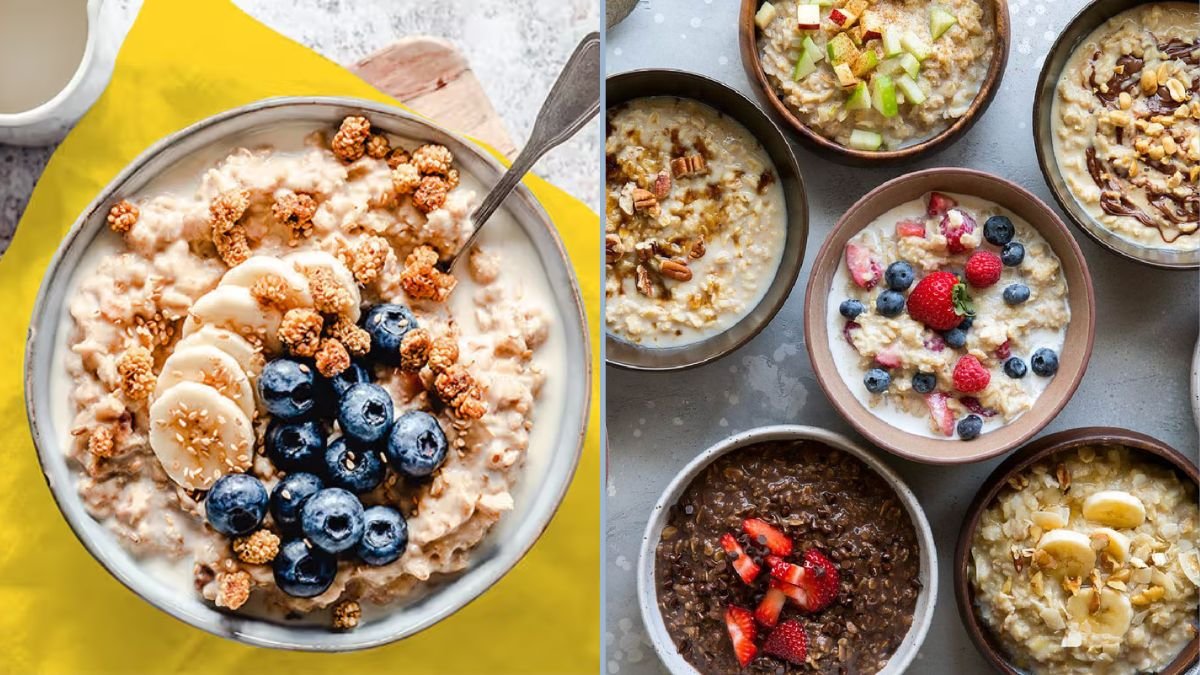Oatmeal has long been celebrated as a wholesome, comforting breakfast staple, but its benefits go far beyond being just a warm, filling meal. Packed with fiber, vitamins, minerals, and antioxidants, oatmeal is a versatile superfood that supports heart health, digestion, weight management, and overall well-being. Its neutral flavor makes it the perfect canvas for countless flavor variations, from sweet and fruity to savory and spicy. In this article, we’ll explore the numerous health benefits of oatmeal, why it deserves a regular place in your diet, and creative ways to spice it up for variety and flavor—all within a vegetarian and plant-based framework.
What Makes Oatmeal So Healthy?
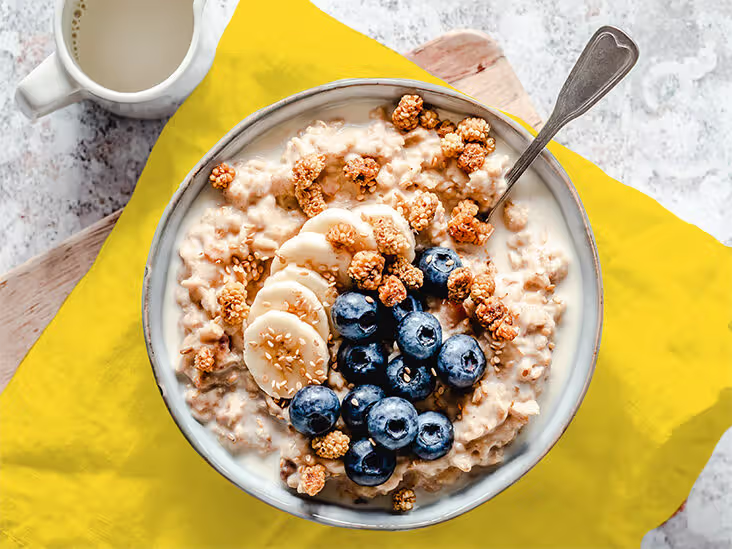
Oats are whole grains, which means they contain the bran, germ, and endosperm. This composition preserves essential nutrients that provide sustained energy and support overall health. Here are the key reasons oatmeal is considered a superfood:
1. Rich in Soluble Fiber
Oats contain a type of soluble fiber called beta-glucan, which has several health benefits:
- Helps reduce LDL cholesterol (“bad” cholesterol) and supports heart health.
- Promotes satiety, making you feel full longer and aiding in weight management.
- Helps regulate blood sugar by slowing down glucose absorption.
One serving of oatmeal can provide 3–5 grams of fiber, depending on the type of oats used.
2. Packed with Vitamins and Minerals
Oats are a good source of:
- Magnesium: Supports muscle and nerve function.
- Phosphorus: Essential for healthy bones and teeth.
- Manganese: Plays a role in metabolism and antioxidant function.
- Iron: Important for red blood cell production and energy.
- B-vitamins: Aid in energy metabolism.
These nutrients work together to provide sustained energy and maintain overall health.
3. Antioxidant-Rich
Oats contain unique antioxidants called avenanthramides, which help reduce inflammation, lower blood pressure, and improve blood flow. Antioxidants combat oxidative stress, protecting cells from damage and supporting long-term health.
4. Supports Digestive Health
The soluble fiber in oats forms a gel-like substance in the gut, which promotes healthy bowel movements and nourishes beneficial gut bacteria. Regular consumption can help prevent constipation and support a healthy microbiome.
5. Weight Management Aid
Oatmeal’s fiber and protein content help control hunger and reduce cravings, making it easier to manage weight. Eating a fiber-rich breakfast can stabilize energy levels and reduce unhealthy snacking later in the day.
6. Versatility and Convenience
Oats are easy to prepare, store well, and can be incorporated into a wide range of meals beyond breakfast—think snacks, baked goods, or savory dishes. Their adaptability makes them ideal for a plant-based diet.
Types of Oats
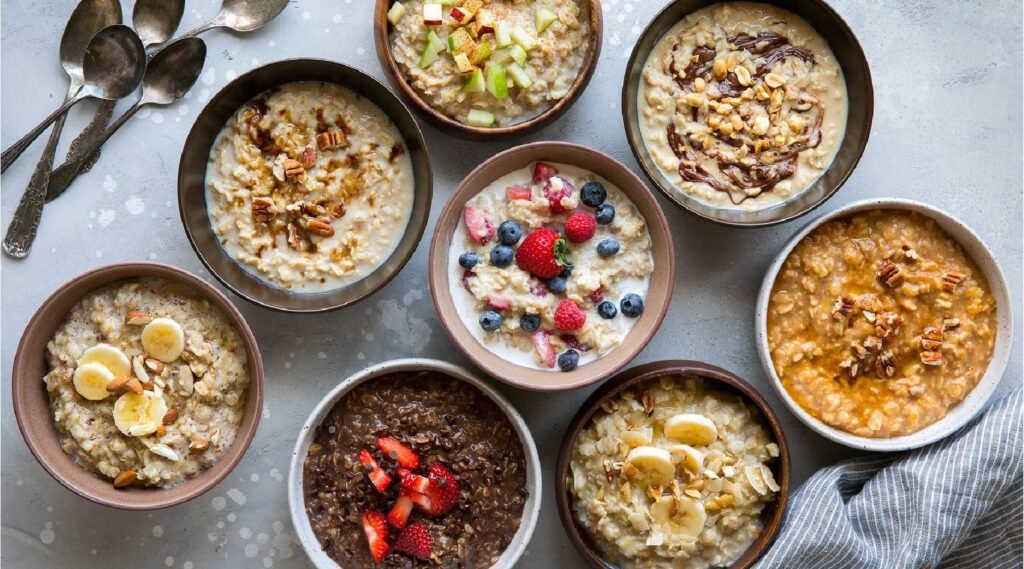
Understanding the types of oats helps you choose the best one for your taste and cooking style:
- Steel-Cut Oats: Whole oat groats chopped into pieces; chewy texture, takes longer to cook, rich in nutrients.
- Rolled Oats: Steamed and flattened; cook faster than steel-cut oats and absorb flavors well.
- Quick Oats: Pre-steamed and rolled thinner; cook quickly but can be softer and less textured.
- Instant Oats: Pre-cooked and dried; fastest cooking but often contain added sugar in packaged varieties.
How to Cook Oatmeal Perfectly
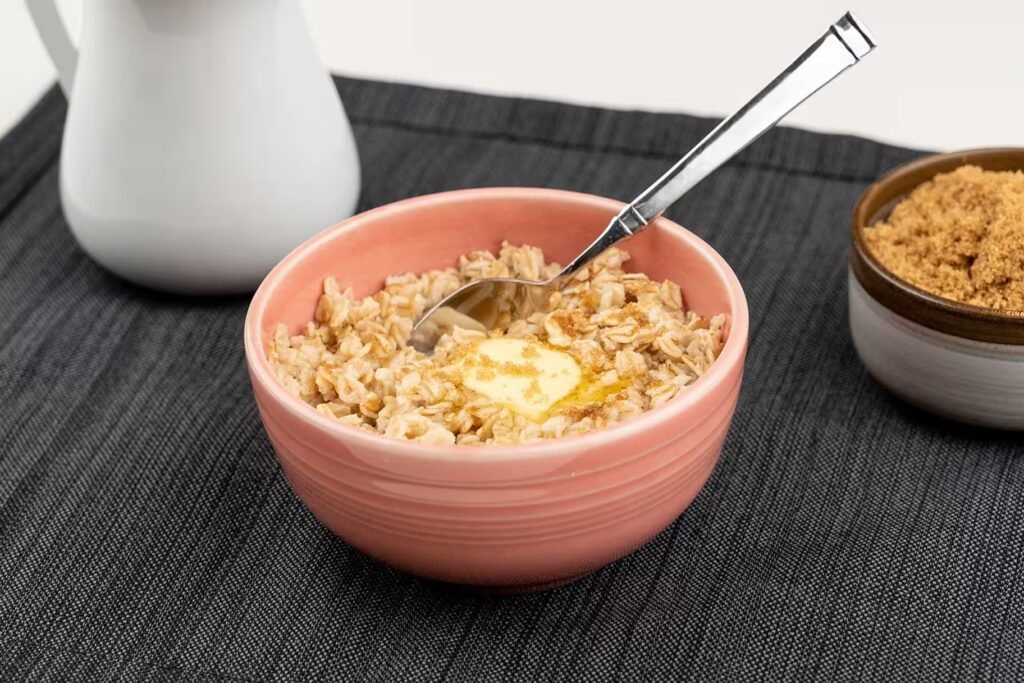
Cooking oatmeal is simple but can be optimized for texture and flavor:
- Measure Your Oats and Liquid: Typical ratios are 1 cup oats to 2 cups water or plant-based milk. Using plant-based milk like almond, soy, or oat milk enhances creaminess and adds flavor.
- Boil and Simmer: Bring liquid to a boil, add oats, reduce heat to low, and simmer. Steel-cut oats take 20–30 minutes; rolled oats take 5–10 minutes; quick oats take 1–3 minutes.
- Stir Occasionally: Prevent sticking and ensure even cooking.
- Flavor Base: Add a pinch of salt, vanilla extract, or spices during cooking to build depth of flavor.
- Consistency: Adjust liquid for creamy or thicker oatmeal depending on preference.
Creative Ways to Spice Up Your Oatmeal
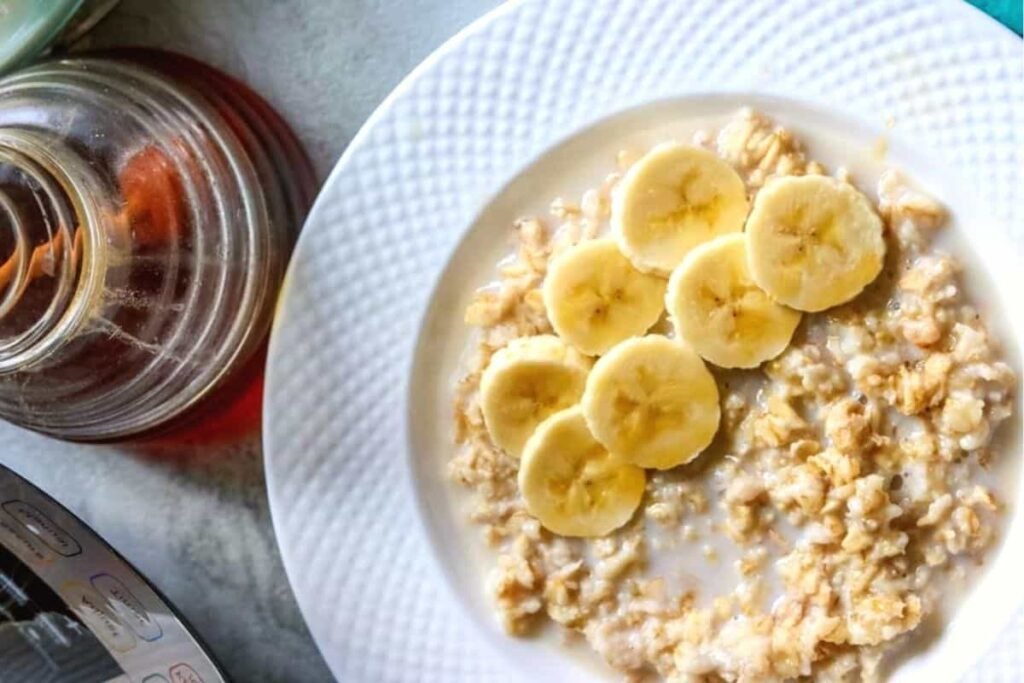
One of the best things about oatmeal is how versatile it is. Here are ways to make it flavorful, exciting, and nutritionally diverse:
Sweet Options
- Fruits: Bananas, berries, apples, mango, or dried fruits like raisins and dates.
- Nuts and Seeds: Almonds, walnuts, chia seeds, flaxseeds, or pumpkin seeds add crunch and healthy fats.
- Spices: Cinnamon, nutmeg, cardamom, ginger, or vanilla enhance aroma and taste.
- Natural Sweeteners: Maple syrup, agave nectar, or mashed bananas provide gentle sweetness.
- Plant-Based Yogurt or Milk: Add creaminess and probiotics when using yogurt alternatives.
Example: Cinnamon-banana oatmeal with chia seeds and almond butter.
Savory Options
- Vegetables: Spinach, mushrooms, tomatoes, or zucchini can be sautéed and mixed into oatmeal.
- Herbs and Spices: Turmeric, black pepper, parsley, or thyme add layers of flavor.
- Plant-Based Protein: Tofu crumbles or cooked legumes make oatmeal hearty and filling.
- Avocado and Seeds: For creaminess, healthy fats, and texture.
Example: Turmeric oatmeal with sautéed spinach, cherry tomatoes, and pumpkin seeds.
Mix-Ins for Texture
- Granola or Toasted Oats: Adds crunch.
- Coconut Flakes or Cacao Nibs: Enhances flavor and nutrient content.
- Nut Butter Swirls: Provides richness and protein boost.
Oatmeal as Part of a Balanced Plant-Based Diet
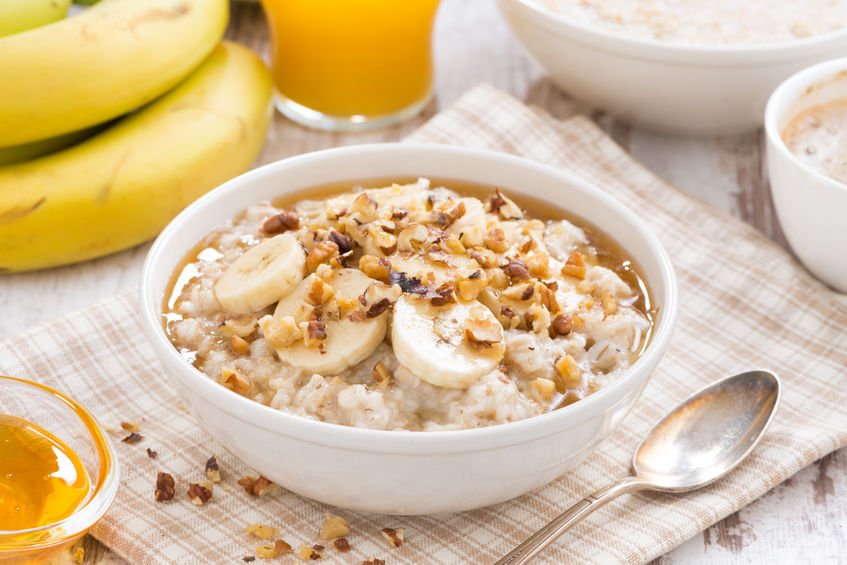
Oatmeal can be a central part of a vegetarian or vegan diet:
- Breakfast: A warm bowl with fruits, nuts, and seeds.
- Snack: Overnight oats or baked oat bars.
- Lunch or Dinner: Savory oatmeal bowls with vegetables and legumes.
- Meal Prep: Make large batches of cooked oats or overnight oats for grab-and-go meals.
Tips for Meal Prep and Storage
- Overnight Oats: Mix oats with plant-based milk, fruits, and seeds. Store in a mason jar in the fridge overnight for an easy breakfast.
- Batch Cooking: Cook large portions of oatmeal, store in the fridge for up to 5 days. Reheat with a splash of plant-based milk.
- Freeze Portions: Pre-portion oatmeal into freezer-safe containers for up to 2 months. Reheat with a little liquid.
Health Benefits Recap
- Heart Health: Beta-glucan fiber lowers cholesterol.
- Digestive Health: Fiber and antioxidants support gut health.
- Weight Management: Satisfying and filling, reduces cravings.
- Stable Energy Levels: Complex carbohydrates release energy slowly.
- Micronutrients: Magnesium, phosphorus, iron, manganese, and B-vitamins support metabolism and overall wellness.
- Adaptable to Plant-Based Diets: Works seamlessly with vegetarian and vegan ingredients for maximum nutrition.
Conclusion
Oatmeal is more than a breakfast option—it’s a nutrient-dense, versatile food that supports overall health. From heart-healthy soluble fiber to protein, vitamins, and antioxidants, oatmeal offers a complete package for energy, satiety, and wellness. By experimenting with sweet or savory toppings, spices, and plant-based mix-ins, you can enjoy a variety of flavorful meals every day.
Incorporating oatmeal into your diet is simple, satisfying, and supports a vegetarian or vegan lifestyle. Whether served hot, cold, sweet, or savory, oatmeal is a canvas for creativity and a powerhouse of nutrition—making it one of the most wholesome foods you can include in your daily routine.
Start with a basic bowl of oats today, then explore the endless flavor possibilities and nutritional benefits that this humble grain has to offer.
I can also create a 7-day oatmeal meal plan with vegetarian and plant-based recipes, flavor variations, and shopping lists to make this article fully actionable for readers.
